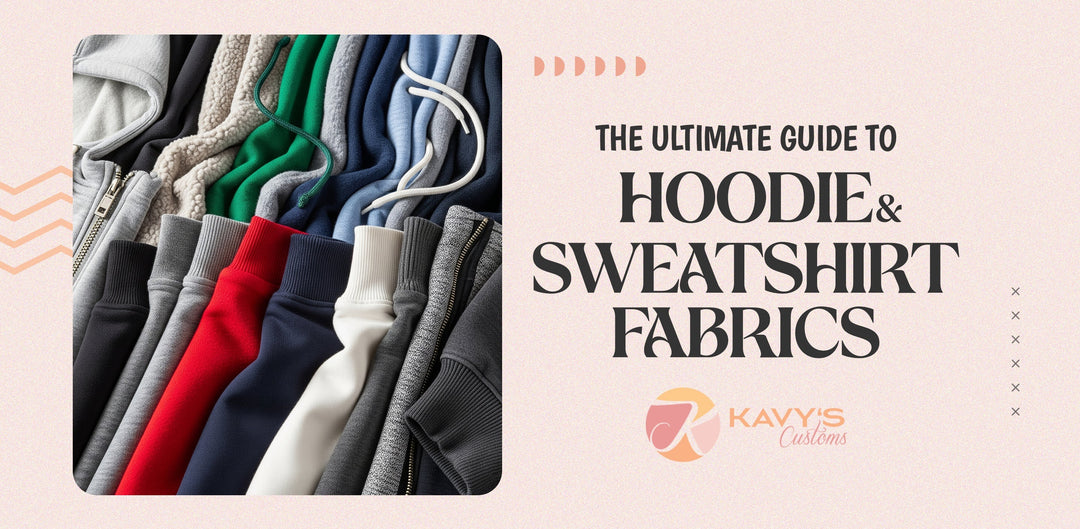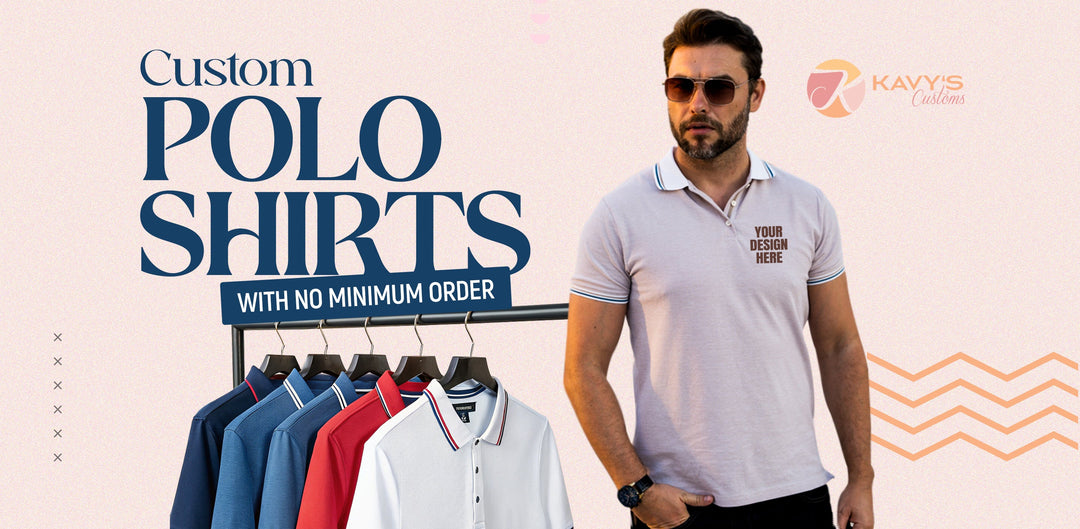Understanding Cotton Varieties: Choosing the Best Fabric for Your Custom T-Shirts
When selecting the perfect t-shirt, one of the most crucial factors to consider is the type of cotton used. Cotton, known for its comfort and breathability, is a staple fabric for t-shirts and hoodies. However, not all cottons are created equal. Let's delve into the various cotton types commonly used for t-shirts to understand their differences and respective advantages.
Traditional Cotton
Traditional cotton is the most widely recognized and used. It comes from the cotton plant and goes through a process that includes harvesting, cleaning, combing, spinning, and then weaving or knitting. Traditional cotton t-shirts are known for their comfort and durability. They're also affordable, which makes them a go-to for bulk purchasing. However, this type of cotton may not be the best for the environment, as conventional cotton farming can involve considerable pesticide use and water consumption.
Organic Cotton
Organic cotton is grown without the use of synthetic pesticides and fertilizers. Its production sustains the health of soils, ecosystems, and people by using natural processes rather than artificial inputs. Organic cotton t-shirts are softer than traditional cotton shirts and less likely to cause allergies or irritations. As consumers become more eco-conscious, organic cotton's popularity is rising despite its higher price point due to its lower environmental impact.
Pima Cotton
Pima cotton, also known as extra-long staple (ELS) cotton, boasts of fibers that are longer than those of traditional cotton. These long fibers result in a fabric that is softer, more durable, and less likely to pill or fray. Pima cotton t-shirts offer a luxe feel and can maintain their quality over time, making them a premium option in the market. They are well-suited for those who prioritize quality and are willing to invest in longer-lasting apparel.
Supima Cotton
Supima is a trademarked name for American-grown Pima cotton. Only about 3% of Pima cotton produced is certified as Supima. It has all the qualities of Pima cotton but is often considered superior due to its strict quality control and traceability. Supima cotton t-shirts are exceptionally soft, strong, and hold color better after repeated washings.
Egyptian Cotton
Famed for its luxuriously soft feel and incredible durability, Egyptian cotton has a global reputation as the finest cotton in the world. Its fibers are even longer than Pima cotton, contributing to a fabric that is strong, light, breathable, and does not pill easily. However, t-shirts made from Egyptian cotton are typically the most expensive due to their high-quality and less widespread production.
Jersey Cotton
Jersey is not a type of cotton but rather a method of knitting cotton fibers into a slight stretchy fabric. Jersey cotton t-shirts are comfortable and have a bit of give, making them ideal for casual wear and activewear. They are also quite durable and maintain their shape well, even after many washes.
Combed Cotton
Combed cotton is a process where cotton fibers are combed to remove short strands and straighten the remaining fibers before spinning. This results in a smoother, softer, and higher quality fabric. Combed cotton t-shirts tend to be pricier than regular ones, but they also offer better comfort and quality.
Slub Cotton
Slub cotton is made by a process that creates slight lumps and textures in the fabric. The look is casual and relaxed, making slub cotton t-shirts unique with a more organic feel. These shirts are airy, comfortable, and perfect for a laid-back, effortless style.
In conclusion, the choice of cotton for your t-shirt impacts not only the feel, look, and longevity of the garment but also the environment. Traditional cotton offers affordability and accessibility, while organic cotton champions sustainability. Pima and Supima cotton lead in quality and luxury, with Egyptian cotton being the top-tier option. Jersey provides comfort and flexibility, whereas combed cotton ups the ante in terms of softness. For casual, breathable wear, slub cotton is unmatched. Understanding these differences helps in making an informed decision that aligns with your preferences, values, and needs, ensuring that your t-shirt is not only comfortable but also reflects your personal style and ethos. Check out our full line of custom t shirts and custom sweatshirts!
Traditional Cotton
Traditional cotton is the most widely recognized and used. It comes from the cotton plant and goes through a process that includes harvesting, cleaning, combing, spinning, and then weaving or knitting. Traditional cotton t-shirts are known for their comfort and durability. They're also affordable, which makes them a go-to for bulk purchasing. However, this type of cotton may not be the best for the environment, as conventional cotton farming can involve considerable pesticide use and water consumption.
Organic Cotton
Organic cotton is grown without the use of synthetic pesticides and fertilizers. Its production sustains the health of soils, ecosystems, and people by using natural processes rather than artificial inputs. Organic cotton t-shirts are softer than traditional cotton shirts and less likely to cause allergies or irritations. As consumers become more eco-conscious, organic cotton's popularity is rising despite its higher price point due to its lower environmental impact.
Pima Cotton
Pima cotton, also known as extra-long staple (ELS) cotton, boasts of fibers that are longer than those of traditional cotton. These long fibers result in a fabric that is softer, more durable, and less likely to pill or fray. Pima cotton t-shirts offer a luxe feel and can maintain their quality over time, making them a premium option in the market. They are well-suited for those who prioritize quality and are willing to invest in longer-lasting apparel.
Supima Cotton
Supima is a trademarked name for American-grown Pima cotton. Only about 3% of Pima cotton produced is certified as Supima. It has all the qualities of Pima cotton but is often considered superior due to its strict quality control and traceability. Supima cotton t-shirts are exceptionally soft, strong, and hold color better after repeated washings.
Egyptian Cotton
Famed for its luxuriously soft feel and incredible durability, Egyptian cotton has a global reputation as the finest cotton in the world. Its fibers are even longer than Pima cotton, contributing to a fabric that is strong, light, breathable, and does not pill easily. However, t-shirts made from Egyptian cotton are typically the most expensive due to their high-quality and less widespread production.
Jersey Cotton
Jersey is not a type of cotton but rather a method of knitting cotton fibers into a slight stretchy fabric. Jersey cotton t-shirts are comfortable and have a bit of give, making them ideal for casual wear and activewear. They are also quite durable and maintain their shape well, even after many washes.
Combed Cotton
Combed cotton is a process where cotton fibers are combed to remove short strands and straighten the remaining fibers before spinning. This results in a smoother, softer, and higher quality fabric. Combed cotton t-shirts tend to be pricier than regular ones, but they also offer better comfort and quality.
Slub Cotton
Slub cotton is made by a process that creates slight lumps and textures in the fabric. The look is casual and relaxed, making slub cotton t-shirts unique with a more organic feel. These shirts are airy, comfortable, and perfect for a laid-back, effortless style.
In conclusion, the choice of cotton for your t-shirt impacts not only the feel, look, and longevity of the garment but also the environment. Traditional cotton offers affordability and accessibility, while organic cotton champions sustainability. Pima and Supima cotton lead in quality and luxury, with Egyptian cotton being the top-tier option. Jersey provides comfort and flexibility, whereas combed cotton ups the ante in terms of softness. For casual, breathable wear, slub cotton is unmatched. Understanding these differences helps in making an informed decision that aligns with your preferences, values, and needs, ensuring that your t-shirt is not only comfortable but also reflects your personal style and ethos. Check out our full line of custom t shirts and custom sweatshirts!







Leave a comment